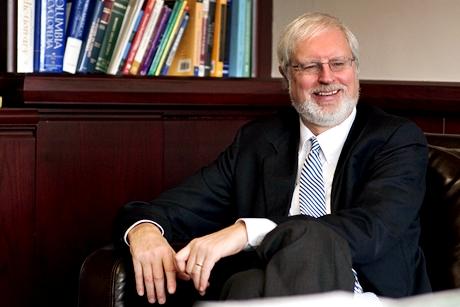Logan to Serve as Adviser on Restatement Third of Torts
RWU Law's resident expert on Torts and the First Amendment will address issues of defamation and privacy in the age of the internet.

Roger Williams University School of Law is proud to announce that Professor David A. Logan has been appointed as an Adviser on the new American Law Institute (ALI) Restatement of the Law Third, Torts: Defamation and Privacy.
As part of a small group of experts, Logan – who served as Dean of RWU Law from 2003 to 2014 – will be advising the project Reporters, Professors Lyrissa Barnett Lidsky of the University of Missouri’s Columbia School of Law and Robert C. Post of Yale Law School.
“My congratulations to David,” said Dean Michael J. Yelnosky. “This section of the Restatement will cover lots of new issues created by the advent and ubiquity of the internet – and the list of advisers reads like a ‘Who’s Who’ of academics, judges, and lawyers.”
Professor Peter Margulies observed that the appointment represented “wonderful and richly deserved recognition” for Logan, who is a noted scholar in the field.
“My scholarship has focused on the intersection of Torts and the First Amendment," Logan said. "So I look forward to working with other experts to restate this fascinating area of law for the next generation of lawyers and judges.”
The project is part of ALI’s ongoing revision of the Restatement Second of Torts, portions of which have already been superseded by the Restatement Third of Torts: Products Liability, Apportionment of Liability, Liability for Physical and Emotional Harm, and Liability for Economic Harm.
The Torts: Defamation and Privacy Restatement will address torts dealing with personal and business reputation and dignity, including defamation, business disparagement, and rights of privacy. Among other issues, the updates will cover the substantial body of new issues relating to the internet.
The Restatement's practical impact is hard to overstate.
“The ALI’s work on torts arguably has been the most influential of our efforts to restate the common law,” said ALI Director Richard Revesz in a statement. “Courts have cited to our Torts Restatements more than 80,000 times. No other ALI publication comes close to this mark. And the Restatement Second of Torts, in particular, has long held the mantle as ‘the most widely accepted distillation of the common law of torts,’ as Justice Souter described it in a 1995 opinion for the Supreme Court of the United States.”
Revesz also emphasized the critical importance of the scholars chosen to work on the new Restatement.
“We seek not only leading scholars in the respective fields but also individuals with the temperament to be fair arbiters of competing positions and the humility to set aside their own deeply held views when doing so is necessary to comply with the rules governing our Restatements,” he said.
For a full list of participants in the project, please visit the ALI website.

